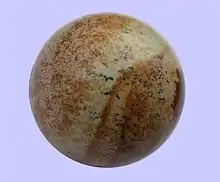jasper
See also: Jasper
English

A jasper ball (2)
Etymology 1
From Middle English jasper, jaspre, from Old French jaspre, a variant of jaspe (modern French jaspe), from Latin iaspis, from Ancient Greek ἴασπις (íaspis).
Noun
jasper (countable and uncountable, plural jaspers)
- (obsolete) Any bright-coloured kind of chalcedony apart from cornelian.
- An opaque, impure variety of quartz, of red, yellow, and other dull colors, breaking conchoidally with a smooth surface.
- Jasperware pottery.
Derived terms
Derived terms
- Jasper National Park
- jasper opal
- jasperated
- jasperite
- jasperize
- jasperoid
- jasperous
- jasperware
- jaspery
- jaspidean
- lavender jasper
- xyloid jasper
Translations
precious stone
|
|
jasperware — see jasperware
See also
Etymology 2
From the male personal name Jasper.
Noun
jasper (plural jaspers)
- (Britain, West Country, Somerset, colloquial) A wasp.
- (US, slang) A person, a guy, especially seen as naïve or simple.
- 1975, Tom Waits, ‘Nighthawk Postcards (From Easy Street)’:
- Standing on the corner like a just-got-in-town jasper.
- 2006, Thomas Pynchon, Against the Day, Vintage 2007, p. 122:
- “That jasper,” sniggered Darby, “never pulled out his ‘dummy’ for nothing but pissing, I bet you!”
- 1968, Charles Portis, True Grit, The Saturday Evening Post
- "I stood there through almost an hour of it before they called Rooster Cogburn to the stand. I had guessed wrong as to which one he was, picking out a younger and slighter man with a badge on his shirt. And I was surprised when an old one-eyed jasper that was built along the lines of Grover Cleveland went up and was sworn."
- 1975, Tom Waits, ‘Nighthawk Postcards (From Easy Street)’:
French
Verb
jasper
- apply different colors of paint flowing together in order to make it look like jasper stone
- Jasper la tranche d’un livre.
Conjugation
Conjugation of jasper (see also Appendix:French verbs)
| present participle | jaspant /ʒas.pɑ̃/ | ||||||
|---|---|---|---|---|---|---|---|
| past participle | jaspé /ʒas.pe/ | ||||||
| infinitive | |||||||
| simple | jasper | ||||||
| compound | avoir + past participle | ||||||
| gerund1 | |||||||
| simple | jaspant /ʒas.pɑ̃/ | ||||||
| compound | ayant + past participle | ||||||
| singular | plural | ||||||
| first | second | third | first | second | third | ||
| indicative | je (j’) | tu | il, elle | nous | vous | ils, elles | |
| (simple tenses) |
present | jaspe /ʒasp/ |
jaspes /ʒasp/ |
jaspe /ʒasp/ |
jaspons /ʒas.pɔ̃/ |
jaspez /ʒas.pe/ |
jaspent /ʒasp/ |
| imperfect | jaspais /ʒas.pɛ/ |
jaspais /ʒas.pɛ/ |
jaspait /ʒas.pɛ/ |
jaspions /ʒas.pjɔ̃/ |
jaspiez /ʒas.pje/ |
jaspaient /ʒas.pɛ/ | |
| past historic2 | jaspai /ʒas.pe/ |
jaspas /ʒas.pa/ |
jaspa /ʒas.pa/ |
jaspâmes /ʒas.pam/ |
jaspâtes /ʒas.pat/ |
jaspèrent /ʒas.pɛʁ/ | |
| future | jasperai /ʒas.pə.ʁe/ |
jasperas /ʒas.pə.ʁa/ |
jaspera /ʒas.pə.ʁa/ |
jasperons /ʒas.pə.ʁɔ̃/ |
jasperez /ʒas.pə.ʁe/ |
jasperont /ʒas.pə.ʁɔ̃/ | |
| conditional | jasperais /ʒas.pə.ʁɛ/ |
jasperais /ʒas.pə.ʁɛ/ |
jasperait /ʒas.pə.ʁɛ/ |
jasperions /ʒas.pə.ʁjɔ̃/ |
jasperiez /ʒas.pə.ʁje/ |
jasperaient /ʒas.pə.ʁɛ/ | |
| (compound tenses) |
present perfect | present indicative of avoir + past participle | |||||
| pluperfect | imperfect indicative of avoir + past participle | ||||||
| past anterior2 | past historic of avoir + past participle | ||||||
| future perfect | future of avoir + past participle | ||||||
| conditional perfect | conditional of avoir + past participle | ||||||
| subjunctive | que je (j’) | que tu | qu’il, qu’elle | que nous | que vous | qu’ils, qu’elles | |
| (simple tenses) |
present | jaspe /ʒasp/ |
jaspes /ʒasp/ |
jaspe /ʒasp/ |
jaspions /ʒas.pjɔ̃/ |
jaspiez /ʒas.pje/ |
jaspent /ʒasp/ |
| imperfect2 | jaspasse /ʒas.pas/ |
jaspasses /ʒas.pas/ |
jaspât /ʒas.pa/ |
jaspassions /ʒas.pa.sjɔ̃/ |
jaspassiez /ʒas.pa.sje/ |
jaspassent /ʒas.pas/ | |
| (compound tenses) |
past | present subjunctive of avoir + past participle | |||||
| pluperfect2 | imperfect subjunctive of avoir + past participle | ||||||
| imperative | – | – | – | ||||
| simple | — | jaspe /ʒasp/ |
— | jaspons /ʒas.pɔ̃/ |
jaspez /ʒas.pe/ |
— | |
| compound | — | simple imperative of avoir + past participle | — | simple imperative of avoir + past participle | simple imperative of avoir + past participle | — | |
| 1 Only usable with preposition en. | |||||||
| 2 In less formal writing or speech, the past historic, past anterior, imperfect subjunctive and pluperfect subjunctive tenses may be found to have been replaced with the indicative present perfect, indicative pluperfect, present subjunctive and past subjunctive tenses respectively (Christopher Kendris [1995], Master the Basics: French, pp. 77, 78, 79, 81). | |||||||
Further reading
- “jasper” in le Trésor de la langue française informatisé (The Digitized Treasury of the French Language).
This article is issued from Wiktionary. The text is licensed under Creative Commons - Attribution - Sharealike. Additional terms may apply for the media files.